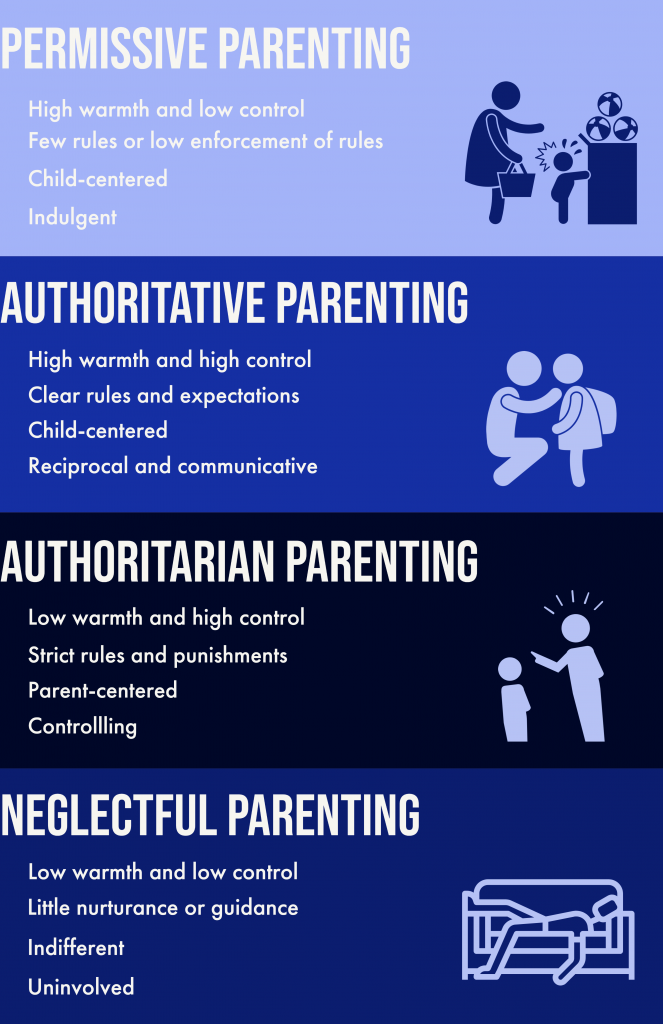1 Parenting Styles
Hanna Jiang
Types of Parenting Styles

Parenting styles can greatly impact a child’s development and overall well-being. Parents and guardians will generally fall into four categories: authoritarian, authoritative, permissive, or uninvolved/neglectful (Maccoby & Martin, 1983, as cited in Kuppens & Ceulemans, 2019). Authoritarian caretakers are typically less nurturing and have high expectations for the child (Sanvictores & Mendez, 2021). On the other hand, permissive caretakers expect little from the child but are more nurturing (Sanvictores & Mendez, 2021). These uninvolved caretakers lack warmth for the child but give them a lot of freedom (Sanvictores & Mendez, 2021). Authoritative caretakers are warm and nurturing while still maintaining clear expectations for the child (Sanvictores & Mendez, 2021).
What Is the Most Effective Parenting Style?
Authoritative parenting is associated with the best social and behavioral outcomes out of the four parenting styles (Kuppens & Ceulemans, 2019). Research has shown that preschool children exposed to authoritative parenting have positive social and behavioral outcomes (i.e., high levels of competence and emotional health) that extend into the teen years (Baumrind, Larzelere, & Owens, 2010, as cited in Segrin & Flora, 2019). Authoritative caregivers establish concrete expectations and communicate with empathy when disciplining their children (Sanvictores & Mendez, 2021). They allow their children to have input in decisions but also ensure that their children understand the basis behind their rules and actions. The goal of this parenting style is independent thinking and autonomy in children.
Mental Health
The way caretakers discipline and interact with children may affect the children’s mental health. Ineffective parenting increases a child’s risk for mental health issues or unhealthy coping mechanisms. More specifically, permissive, neglectful, and authoritarian parenting may increase a child’s risk for depression and anxiety (Lim & Barlas, 2019). For more information on depression and anxiety in children, please visit the Childhood Depression and Anxiety chapter.
According to Ciuhan (2021), there are strong associations between permissive parenting and generalized anxiety disorder as well as atypical behavior in children. Although permissive caregivers treat their children with warmth, their overprotective parenting style coddles children and slows emotional growth. This creates dependency and may leave children unprepared to deal with negative experiences. For this reason, researchers theorize that permissive parenting leads to lower emotional intelligence (Wischerth et al., 2016).

Authoritarian and neglectful caregivers may also harm their children’s mental health. According to Coates and Messman-Moore (2014), college women who had non-responsive, overly demanding, or harsh parents were more likely to have worse mental health. These women had increased levels of depression, negative self-image, and unhealthy emotional processing. Children of neglectful or authoritarian caregivers perceive their demands or unresponsiveness as their own fault. Researchers believe that this self-blame may also present itself in other situations and weaken a child’s mental resilience (Coates & Messman-Moore, 2014). Therefore, caretakers should be mindful of their parenting styles’ impact on children (Lim & Barlas, 2019). Please visit the Bullying chapter for information on the effect of parenting styles on bullying tendencies in children.
Behavior
Many parents and guardians worry about the impact their parenting will have on their children’s behavior. Some caretakers choose to be controlling in hopes that it will stop unruly actions. However, this can have the opposite effect and increase the chances that a child will want to misbehave. A study of adolescents in New Hampshire found that authoritative parenting was less likely to cause delinquency, while authoritarian parenting was more likely to cause unacceptable behaviors (Trinker et al., 2012). Authoritarian parenting may negatively impact a child’s behavior because it lowers their views of caretakers as authorities. Trinker et al. (2012) found that authoritarian and permissive parenting led to lower perceptions of parental legitimacy. Additionally, cold or distant caretaker attitudes increase the likelihood of aggressive and unruly children. A permissive style communicates unclear rules or expectations, which increases the chances of disruptive actions (Hosokawa & Katsura, 2019). Establishing clear boundaries and expectations while also nurturing a child will increase the chances that they will respect their parent or guardian (Trinker et al., 2012).
Resources
Parenting can be challenging for caretakers to navigate. However, the federal government and private organizations address various concerns to give a child healthy support and care. Below are some resources for child development information and assistance.
- Circle of Parents
- Circle of Parents provides tip sheets concerning discipline, rules, schoolwork, and other family situations to help caretakers.
- Facts for Families
- Facts for Families is a resource from the American Academy of Child and Adolescent Psychiatry that contains information on more than 100 topics that impact children and their families.
- Parents as Teachers
- Parents as Teachers is an organization that fosters optimal early development and health of children by matching caregivers with trained professionals.
- Keep Connected
- Keep Connected provides knowledge and resources to those seeking support with parenting issues through comprehensive programs and interactive digital materials.
- The ChildHelp National Child Abuse Hotline
- The ChildHelp National Child Abuse Hotline is a national hotline available for witnesses or victims of child abuse.
Key Takeaways
- The way a caregiver raises a child will affect their mental and behavioral development and health outcomes.
- Research suggests that authoritative parenting leads to the best health outcomes out of the four parenting styles.
- Disciplining children with moderate levels of control and warmth will establish clear expectations for them while still respecting their independence.
- Mental health and emotional growth may be harmed by permissive, authoritarian, and neglectful parenting.
- Studies show that excessive levels of warmth or control may lead to adverse behavioral or cognitive outcomes.
References
Baumrind, D., Larzelere, R. E., & Owens, E. B. (2010). Effects of preschool parents’ power assertive patterns and practices on adolescent development. Parenting, 10(3), 157–201. https://doi.org/10.1080/15295190903290790
Coates, A. A., & Messman-Moore, T. L. (2014). A structural model of mechanisms predicting depressive symptoms in women following childhood psychological maltreatment. Child Abuse & Neglect, 38(1), 103–113. https://doi.org/10.1016/j.chiabu.2013.10.005
Hosokawa, R., & Katsura, T. (2019). Role of parenting style in children’s behavioral problems through the transition from preschool to elementary school according to gender in Japan. International Journal of Environmental Research and Public Health, 16(1), 21. https://doi.org/10.3390/ijerph16010021
Kuppens, S., & Ceulemans, E. (2019). Parenting styles: A closer look at a well-known concept. Journal of Child and Family Studies, 28(1), 168–181. PubMed. https://doi.org/10.1007/s10826-018-1242-x
Lim, C. R., & Barlas, J. (2019). The effects of toxic early childhood experiences on depression according to Young Schema Model: A scoping review. Journal of Affective Disorders, 246, 1–13. https://doi.org/10.1016/j.jad.2018.12.006
Sanvictores, T., & Mendez, M. D. (2022). Types of parenting styles and effects on children. In StatPearls. StatPearls Publishing. http://www.ncbi.nlm.nih.gov/books/NBK568743/
Segrin, C., & Flora, J. (2019). Fostering social and emotional intelligence: What are the best current strategies in parenting? Social and Personality Psychology Compass, 13(3), e12439. https://doi.org/10.1111/spc3.12439
self-directing freedom and especially moral independence
an anxiety disorder marked by chronic excessive anxiety and worry that is difficult to control, causes distress or impairment in daily functioning, and is accompanied by three or more associated symptoms (such as restlessness, irritability, poor concentration, and sleep disturbances)
conduct that is out of accord with accepted behavior or the law
perception of a caregiver's authority as appropriate, proper, and just

